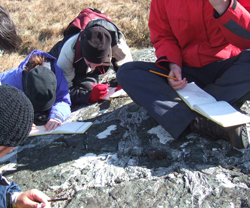Bruce Yardley and colleagues from the Accreditation Committee ask whether the Geological Society’s Accreditation Scheme for undergraduate degrees is fit for purpose
Download the survey summary here

The Society’s Accreditation Scheme for first degrees has been running for around 20 years. It was set up to provide a fast track for geologists and geophysicists to become Chartered, by demonstrating that their first degree adequately covered the basics.
Most UK Earth science degrees are now accredited. Such courses must include core geoscience content and departments must show that their teaching staff are appropriately qualified. Emphasis is on field training and independent mapping, but other requirements include basic mathematics and core subjects including structural geology, mineralogy, petrology, palaeontology, remote sensing and GIS. But, do these requirements really help make graduates more employable? Early in 2018, the Accreditation Committee, together with the Society’s Education Department, decided to undertake a survey of employers to determine how satisfied they are with accredited degrees.
We received 124 responses, mostly from the engineering and environmental sectors. However, some responses came from the oil and gas, exploration and mining sectors, as well as from a range of consultants, and these employers seem to expect different skill sets compared to engineering and environmental employers.
Gratifyingly, over 73% of responses to the question “Overall, how happy are you with the quality of graduates from accredited undergraduate degrees?” were “happy” or “very happy”, with just 6% “unhappy” (the other category was “ambivalent”). However, respondents from the minerals and hydrocarbon sectors are much more likely to be unhappy with the training of accredited graduates.
For most degree schemes, employers agree that the main topics specified for accreditation requirements are important. Mathematics, structural geology and geological fieldwork generally score 90% + approval ratings, while GIS/remote sensing is also highly rated. There is strong support for independent mapping projects, but also recognition that more could be done to teach students to take samples and use instruments in the field. Mineralogy, petrology and palaeontology fared less well. Fewer respondents reported these subjects as important in their work, and sectors that see them as important, reported that training is often inadequate. The survey identified no single topic that should be added to the accreditation requisites, but many respondents asked for stronger requirements for statistics and communication skills.
We also asked, “Do you see differences between graduates with BSc and MGeol/MEarthSci (not MSc) undergraduate degrees?” Evidently, some employers, like many university applicants, do not understand the difference between a taught postgraduate MSc and a four-year undergraduate masters. Many employers favour graduates with a BSc followed by a vocational MSc, but where the employer’s priority is a good all-round training in geology, the undergraduate four-year degree is preferred. The Society accredits both types of degree. Should it also be proactive in explaining the options to potential students?
Overall, our survey suggests that existing accreditation requirements fall broadly in line with expectations, but the results provide important feedback to academic departments and the Accreditation Committee. Some employers are happy to take on graduates with a non-accredited degree, provided the graduate had a good all round training and fieldwork experience. Others prefer to focus on students with accredited degrees aligned with their sector, rather than general geology and geophysics degrees.
The Accreditation Committee’s job is to specify the content that is required for graduates to qualify for fast track to Chartership, not to tell university departments what to teach. However, we hope departments will find the survey feedback interesting.
This is not the end of the process. We will send the full report to Council, to the respondents to the survey requesting further comments and to University Geoscience UK. The report will inform a broader review of accreditation being undertaken by the Society. We also aim to streamline the application process for both accreditation and re-accreditation of undergraduate programmes, to make it a less onerous task for departments.
By Prof Andy Saunders (Accreditation Officer), Prof Andy Smith (Chair, Accreditation Committee), Prof Bruce Yardley (Chair, Accreditation Committee Review Group) and Dr Bill Gaskarth (past Chair, Accreditation Committee)
Details of the current accreditation requirements are available at
https://www.geolsoc.org.uk/Education-and-Careers/Universities/Degree-Accreditation/Aims-and-Requirements-for-Accreditation